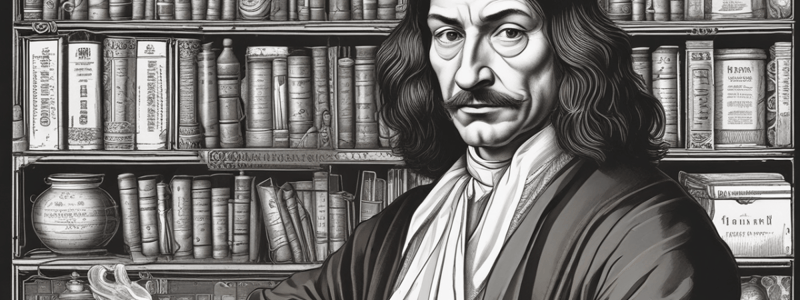Podcast
Questions and Answers
What is René Descartes commonly known as?
What is René Descartes commonly known as?
- The father of the Renaissance
- The father of modern philosophy (correct)
- The father of modern science
- The father of mathematics
What did Descartes feel was the only certain knowledge he gained from his education?
What did Descartes feel was the only certain knowledge he gained from his education?
- History
- Mathematics (correct)
- Biology
- Literature
Why did the Renaissance ideas lead to conflicts in the 17th century?
Why did the Renaissance ideas lead to conflicts in the 17th century?
- They promoted slavery
- They pitted science and religion against each other (correct)
- They caused economic downturns
- They led to wars between nations
What did Descartes have in 1618 that inspired him to develop a new method of science?
What did Descartes have in 1618 that inspired him to develop a new method of science?
Who did Descartes have a confrontation with regarding the basis of science?
Who did Descartes have a confrontation with regarding the basis of science?
What is the title of the book published by Descartes in 1641?
What is the title of the book published by Descartes in 1641?
According to Descartes, why should science come from the mind rather than the senses?
According to Descartes, why should science come from the mind rather than the senses?
What is the idea behind Descartes' famous phrase 'I think, therefore, I am'?
What is the idea behind Descartes' famous phrase 'I think, therefore, I am'?
What is the purpose of Descartes' three arguments of doubt?
What is the purpose of Descartes' three arguments of doubt?
How does Descartes ultimately prove the existence of the external world?
How does Descartes ultimately prove the existence of the external world?
Flashcards are hidden until you start studying
Study Notes
Life and Career of René Descartes
- French philosopher, scientist, and mathematician known as the 'father of modern philosophy'
- Attended Jesuit College of La Flèche from 1606 to 1614, where he felt that only mathematics provided certain knowledge
- In 1618, joined the Dutch army in Germany, where he had dreams that led him to develop a new method of science
- Engaged in discussions with other philosophers and scientists, leading to the publication of his book "Meditations on First Philosophy" in 1641
Philosophy and Contributions
- Argued that science should come from the mind, not senses, as senses are untrustworthy
- Presented three arguments to question the reliability of senses: the deceiving God argument, the evil demon argument, and the dream argument
- Established certainty through the famous phrase "I think, therefore, I am," which proves one's own existence
- Argued that God's existence is necessary to prove the existence of the external world
Relationship Between Science and Religion
- Challenged skeptics who questioned the nature of knowledge and the sciences
- Found a middle ground between science and religion, arguing that a perfect being (God) would not deceive humanity
- Provided a basis for certainty in the sciences and mathematics through reason and the mind
Studying That Suits You
Use AI to generate personalized quizzes and flashcards to suit your learning preferences.




